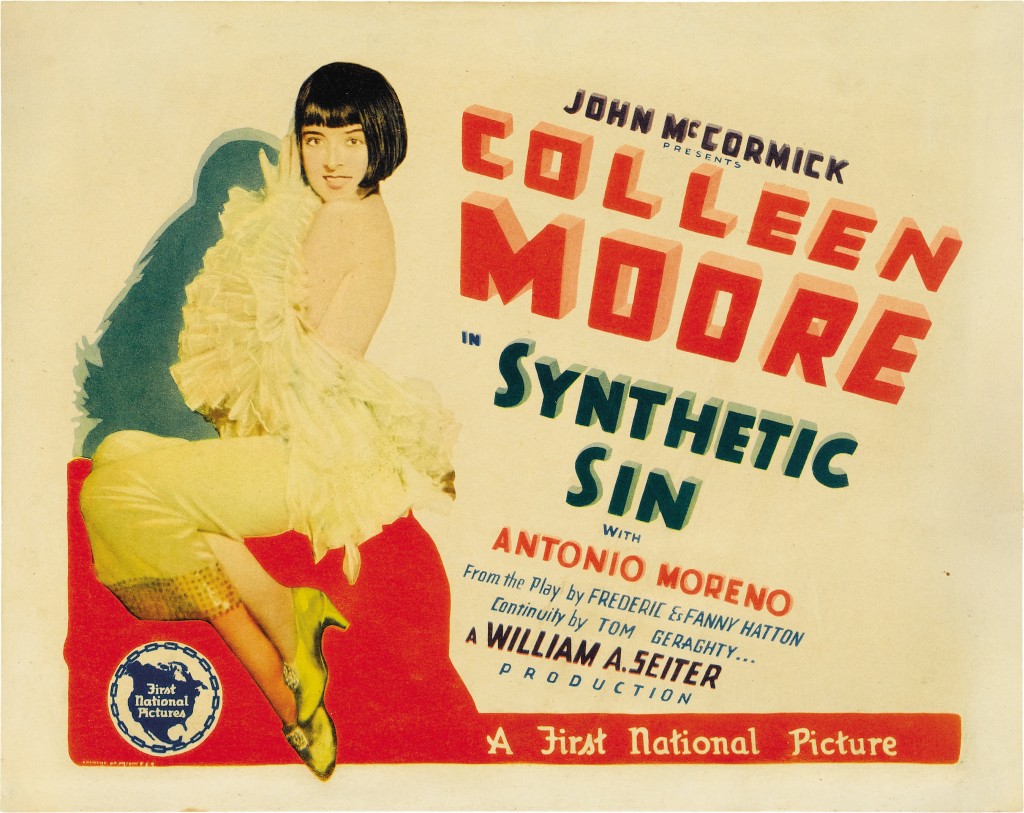For 35 years the Syracuse Cinephile Society’s annual Cinefest confab has put the spotlight on examples of forgotten celluloid from Tinseltown’s silent and early sound eras. But all good things must come to an end, as Cinefest takes its final bow on Thursday, March 19, through Sunday, March 22, at Liverpool’s Holiday Inn, 441 Electronics Parkway.
And they’re not kidding, either: The 16mm projector equipment will be sold to the highest bidder after the last movie gets threaded through those sprockets.
It was never easy to put together the annual event, which was initiated by the late Cinephile founder Phil Serling in 1981 as a grouping of below-the-radar oldies that were culled from film archives and private collectors. Yet Cinephile president Gerry Orlando admitted that the going got tougher in recent years: The archives were committing new restorations to the digital format instead of creating 16mm prints, while the made-to-order DVDs from Warner Archives, while a boon for movie lovers, put a crimp in Cinefest’s potential pipeline of screening candidates.

“It’s also harder to find parts for the 16mm projectors,” Orlando opines, “and a lot of the prints are shrinking and warping, so it’s harder to give a good presentation. This is a big reason why we’re going to digital presentations on Monday nights during the Cinephile screenings at the Spaghetti Warehouse.” Orlando affirms that even after Cinefest’s farewell, the Cinephile shows will live on with its spring and fall schedules.
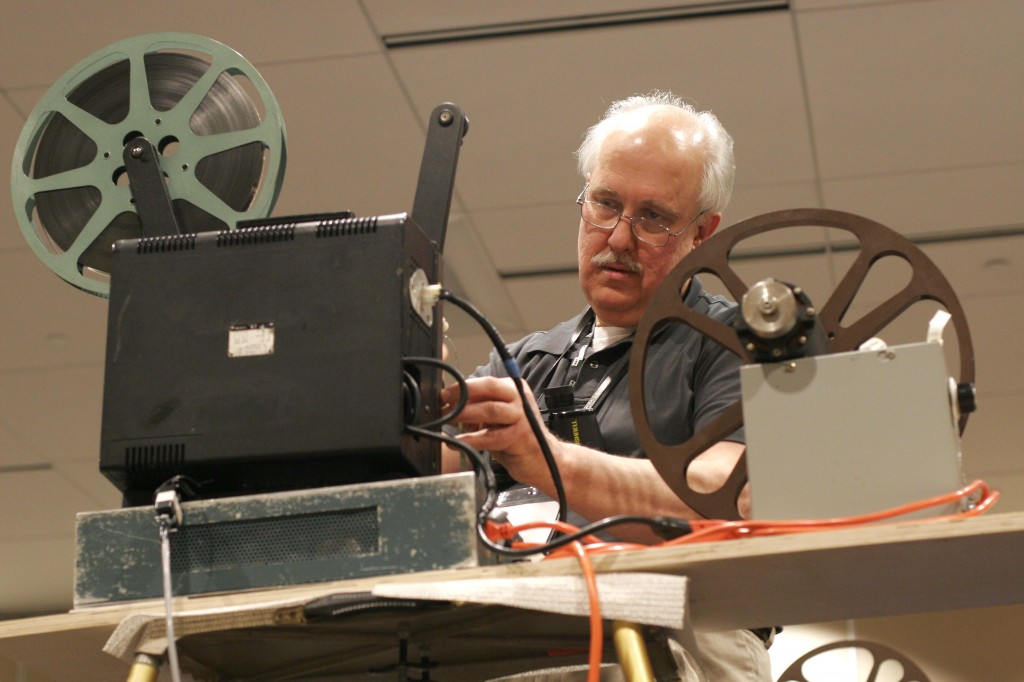
While reactions from the loyal Cinefest dealers of movie merchandise have leaned toward the unhappy side, Orlando says that they are understanding about the situation. As for longtime Cinefest visitor Leonard Maltin, the film guru who hosts the annual Sunday-morning auction of arcane bric-a-brac, Orlando quoted Maltin’s comment: “Well, it’s sad, but it’s probably time.” And Maltin has enough movie-biz savvy to understand the digital dilemma.
“I’m really sad,” says Brooklyn dealer Gary Balaban, who specializes in hard-to-find Scopitone jukebox videos. “Cinefest has been a most special joy. From the moment I arrive it’s exciting, with an instant glow of fun and anticipation. But Sundays are always sorta sad for me, knowing I won’t see these people again for another year. I can’t even imagine what this year’s final Sunday will be like. I met many good people at Cinefest over the years, and I plan on ultra-socializing and seeing even more of the films this year.”
Art Pierce, executive director of Rome’s Capitol Theatre and the driving force behind the annual summertime movie blowout Capitolfest, also has fond memories. “I’ve been going to Cinefest since 1985, for virtually my entire adult life,” he admits. “It is such an important event in my life that it has become a dividing point in the year: ‘That’s not until after Cinefest,’ or ‘We’ll take care of that after Cinefest.’ Although Phil Serling passed away a year and a half before the first Capitolfest, he is largely responsible for the manner that we show classic, and especially silent, movies at the Capitol. “He was the one who initially suggested that we get Philip Carli to accompany the first silent movie we did here in 2002.”
“Cinefest creates a world all its own for four days,” Pierce continues. “One doesn’t encounter persons that are dedicated to movies like the Cinefest crowd on a regular basis. I can certainly understand why the folks who run it feel it’s time to call it a day; putting on a festival like this is clearly a tremendous amount of work. They are volunteers who essentially give their lives over to the operation of Cinefest–not just for the weekend, they are working on this all year.”
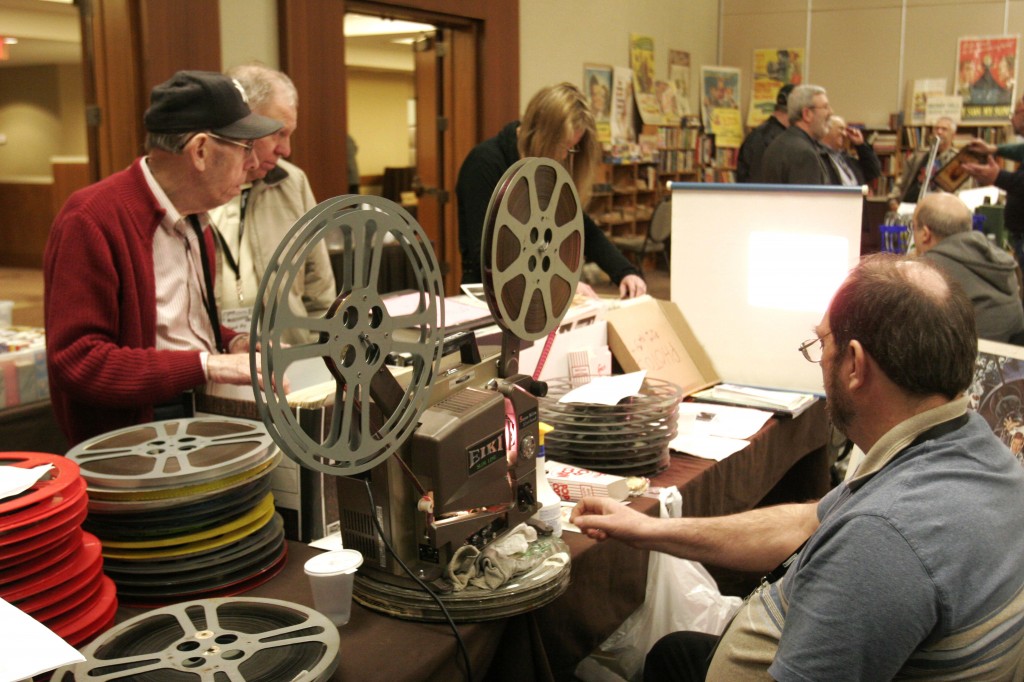
For its grand finale, Cinefest 35 is looking at a record year in attendance. Whereas previous fests have averaged 500 visitors, advance registration will blow past the 700 mark this weekend. “I’m just pleased that we’re really going out with a bang,“ Orlando says. “My slogan is, ’We’re trying to have a fun party, not a sad wake.’”
There will be plenty of 16mm screenings mixed in with digitally projected Hollywood treasures at the hotel’s convention center. Dealer rooms are also sprawled about the hotel hallways, with four-color lobby cards and posters, magazines, books, DVDs and much more. In previous years some dealers have even toted their musical instruments and got together for impromptu jam sessions. And the one can’t-miss event is the annual Sunday-morning auction hosted by Leonard Maltin, who brings a truckload of one-liners for the occasion.
The Lineup
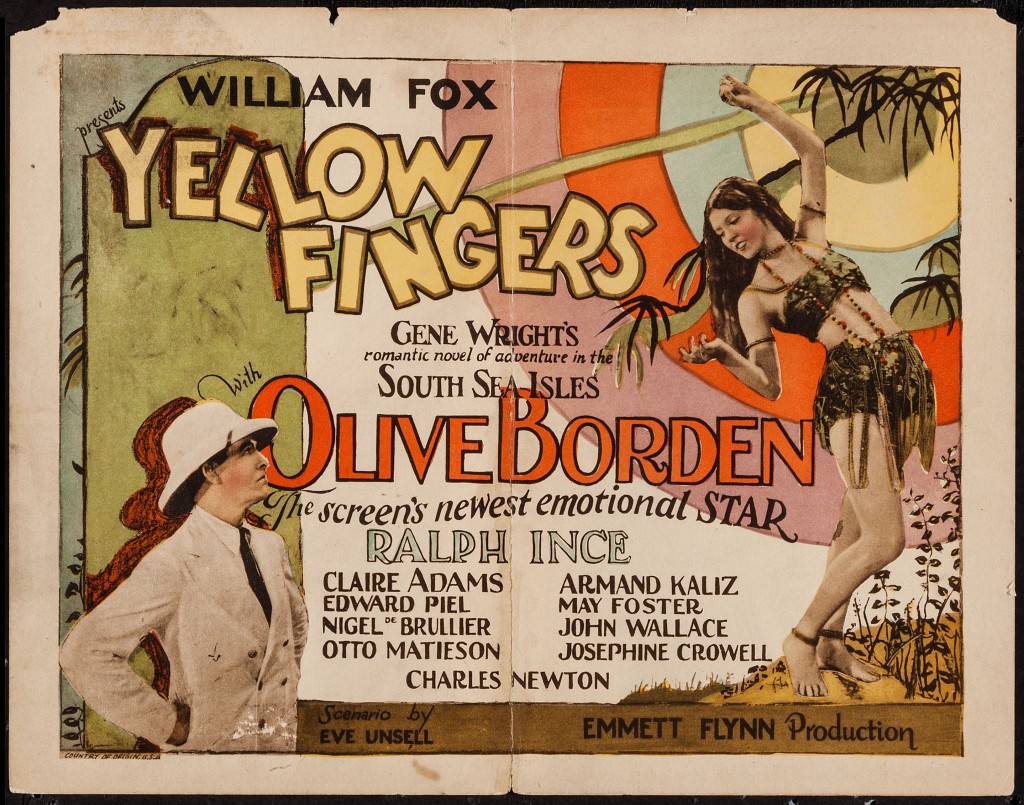
Following a lunch break will be the seventh annual batch of old coming attractions (1:15 p.m.), with host Ray Faiola focusing on trailers from RKO Radio Pictures, including a few rarities touting the studio’s B-movie output. Two more hard-to-see Fox entries take over the Cinefest screen: 1933’s Life in the Raw (2:15 p.m.) features stalwart George O’Brien and newbie Claire Trevor in a fast-paced western, and the 1924 silent fantasy-comedy The Last Man on Earth (3:20 p.m.) offers Earle Foxe in the title role as a sad sack who survives a pandemic that wipes out the world’s male population, then has to fend off womankind‘s amorous advances.
The afternoon concludes with Universal’s 1937 antiwar epic The Road Back (4:30 p.m.), unseen since its release despite the pedigrees of director James Whale (Bride of Frankenstein) and author Erich Maria Remarque (All Quiet on the Western Front). The studio tampered with the flick in order to appease the Nazi Germany film distribution market, while adding comic elements featuring Slim Summerville and Andy Devine that infuriated Whale, all of which derailed what should have been a potent drama. Still, it scored big at the box office.
The evening’s flicks commence at 8 p.m. with a trio of short subjects: the 1948 RKO item It Pays to be Ignorant, based on the long-running radio quiz show; a world premiere of the restoration of the 10th chapter of the 1929 Mascot serial King of the Congo, featuring Boris Karloff as a gangster named Scarface; and the 1935 Hal Roach short Lucky Beginners, with host Eddie Foy Jr. introducing acts such as trapeze artist Tarzan Goldberg!
Janet Gaynor co-stars in Fox’s 1926 fantasy The Return of Peter Grimm (9 p.m.), from veteran director Victor Schertzinger, with Alec B. Francis as a dead curmudgeon who comes back from the grave in search of spectral atonement. Next comes a double bill of silents starring 1920s-era screen heartthrob Johnnie Walker. Captain Fly-By-Night (10:10 p.m.) casts Walker in a Zorro-like adventure with lots of stunts directed by William K. Howard. And the night ends with The Third Alarm (11:15 p.m.), with Walker in a zippy yarn about firefighters.
The opener for the morning slate on Friday, March 20, features the 1930 Vitaphone short Service Stripes (9 a.m.), starring radio comic Joe Penner. The 1931 Fox drama Men On Call (9:10 a.m.) offers Edmund Lowe as a train engineer in love with a stage dancer (Mae Clarke). The 1929 short Me and the Boys (10:20 a.m.) features performances by jazz greats including Jimmy McPartland, Benny Goodman, Jack Teagarden and more. (Are you listening, Frank Malfitano?) The film was considered lost until its 2013 rediscovery in Australia.
Dick Bann hosts the first of two Cinefest programs devoted to the legacy of comedy producer Hal Roach show (10:30 a.m.). Among the treasures: Las Fantasmas (1930), a Spanish-language version of an Our Gang short starring Jackie Cooper; the 1929 talkie short Crazy Feet with Cinefest faves Charley Chase and Thelma Todd; the 1929 Edgar Kennedy soundie Dad’s Day; and some other surprises.
The afternoon session begins with film historian Eric Grayson’s touring presentation titled “The Story of Color in the Movies” (1 p.m.), which traces all the major processes including three-strip Technicolor, Cinecolor and more. Spencer Tracy headlines the 1932 Fox drama Painted Woman (2:30 p.m.), a South Seas tale mixing brassy dames, seasoned skippers and a cholera outbreak.
Five slapstick one-reelers from 1914 to 1917 will be presented under the umbrella title “Vitagraph Varieties” (3:40 p.m.), featuring long-ago talents such as Flora Finch, Sidney Drew and Larry Semon. Capping the afternoon is The Second Floor Mystery (4:45 p.m.), a 1930 Warner Brothers mystery-comedy starring the then-married star couple of Loretta Young and Grant Withers.
The evening slot begins with the world premiere of the horror-movie short Bride of Finklestein (8 p.m.), the new cinema spoof from auteur and film preservationist Michael Schlesinger, who brought his previous comedy It’s a Frame-Up to the 2013 Cinefest. The fifth annual installment of the “Song in the Dark” program (8:20 p.m.), hosted by Richard Barrios, offers another cornucopia of excerpts and deleted musical numbers from early sound musicals. Barrios will also be on hand to sign copies of his book, Dangerous Rhythm: Why Movie Musicals Matter.
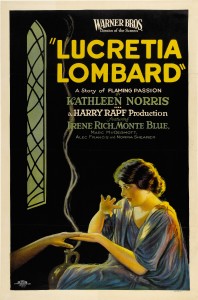
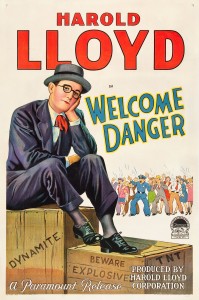
The afternoon commences with a slapstick batch of silent one-reelers presented under the title “Florida Fun Factories” (1 p.m.). Oliver “Babe” Hardy is in 1915’s An Expensive Visit, shot in Jacksonville, and there are four other examples of cinematic frivolities from the Sunshine State. Swinging into action next is the 1926 Paramount silent The New Klondike (2:15 p.m.), with Thomas Meighan cast as a baseball player in Florida for Ring Lardner’s original story.
The 1934 RKO short Sea Sore (3:25 p.m.) has scene-stealing from Baby Rose Marie, who carried on the comic tradition 25 years later to play staff writer Sally on TV’s The Dick Van Dyke Show. My Lips Betray (3:45 p.m.) is a 1933 Fox musical designed to showcase European star Lilian Harvey, with funnyman El Brendel making another Cinefest appearance, much to the presumed delight of Louis Despres, who runs a website devoted to the Swedish comedian. And director Edwin S. Porter’s Tess of the Storm Country (4:50 p.m.) is the 1914 Paramount silent classic with Mary Pickford in one of her favorite roles.
The evening screenings start with the third Cinefest appearance of Slim Summerville for the 1930 Universal comedy short We We Marie (8 p.m.). Syracuse Cinephile Society president Gerry Orlando has carved out some time to say a few syllables to the audience (8:20 p.m.), so get out your handkerchiefs, folks. Next comes the 1941 British short Tea Making Tips (8:30 p.m.), and who indeed knows better about the glories of pekoe dunking?
A brief selection of home movies devoted to silent star Colleen Moore (8:45 p.m.) paves the way for the 1929 First National comedy Synthetic Sin (8:50 p.m.), about a wanna-be floorboards performer who learns about Method acting the hard way. The 1918 silent comedy The Danger Game (10:05 p.m.), shot in Fort Lee, N.J., offers Madge Kennedy as a novelist who gets involved with a burglary.
Moved to a late-night time slot this year is the seventh annual salute to Justin Herman, the Peabody Award-winning writer-director behind two comedy shorts from Paramount’s Pacemaker and Topper series: 1947’s Babies, They’re Wonderful, with an early screen appearance by Tom Ewell, and 1955’s Oscar-nominated Three Kisses, about the Irish sport of hurling (11:10 p.m.). Cinefesters will get to see the late Herman’s own prints of these rarities. The night’s final feature is the 1933 programmer The Back Page (11:35 p.m.), one of only two features from Pyramid Productions. Peggy Shannon stars as a newshound for a teensy burg’s daily paper, with Sterling Holloway, Claude Gillingwater and other familiar supporting players.
Before the 10:30 a.m. auction commences on Sunday, March 22, Cinefest will unspool Paramount’s 1932 The Big Broadcast (9 a.m.), with crooner Bing Crosby effortlessly rising to stardom in this strange pre-Code musical comedy. There is also comic relief from George Burns and Gracie Allen, and more songs from Kate Smith (“When the Moon Comes Over the Mountain”), the Mills Brothers (“Tiger Rag”) and Cab Calloway (“Minnie the Moocher,” “Kickin’ the Gong Around”).
After the auction will be the 1956 short subject with the marquee-busting title The History and Development of the 35mm Projector (noon) from director of photography Don Malkames. Oh, the irony, especially during Cinefest 35. Feel free to weep at how these once-indispensable celluloid-screening contraptions have now been supplanted by soulless digital gizmos.
Dorothy Mackaill headlines the 1931 Fox pre-Code item Once a Sinner (12:30 p.m.), with Joel McCrea and George Brent in their salad days. Hoot Gibson rides again in the 1925 sagebrush saga The Calgary Stampede (1:40 p.m.), featuring lots of two-gun action in this Universal silent. And Dick Bann returns with more unseen-for-years items devoted to producer Hal Roach, including a 1959 CBS-TV episode of Gale Storm’s Oh! Susanna sitcom with Boris Karloff as a co-star and scenes that take place on the Roach studio lot.
Two seaworthy silents cap the final afternoon. The 1924 Paramount outing Code of the Sea (3:40 p.m.) offers Rod LaRocque as a coward who ultimately must prove his own worth, under the direction of Victor Fleming (The Wizard of Oz, Gone With the Wind). And in a sentimental gesture, Cinefest 35 unspools its last reels ever with First National’s 1922 nautical adventure The Sea Lion (4:40 p.m.), with Hobart Bosworth in hero mode. Sea Lion was the first silent to be screened at the inaugural 1981 Cinefest.
A whopping eight ivory-ticklers will be on hand with piano accompaniments on the silents: Philip Carli, Jon Mirsalis, Andrew Simpson, Jeff Rapsis, Makia Matsumara, Judith Rosenberg, Ben Model and Gabriel Thibaudeau. Authors and film historians who will also be attending Cinefest include the aforementioned Richard Barrios (A Song in the Dark: The Birth of the Musical Film), as well as Martin Grams Jr. (the 816-page history of The Green Hornet). There will also be several archivists to handle introductions of specific features.
Admission for all four days is $85, with daily ducats fetching $30. The dealers’ rooms will also be open to the public on Saturday, 10 a.m. to 6 p.m., with a $5 admission. For Cinefest information, visit syracusecinephile.com; for Holiday Inn details, call 457-1122.



